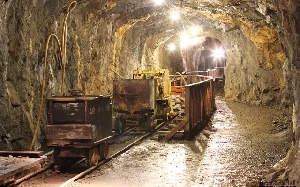- Home - News
- Elections 2024
- News Archive
- Crime & Punishment
- Politics
- Regional
- Editorial
- Health
- Ghanaians Abroad
- Tabloid
- Africa
- Religion
- Photo Archives
- Press Release
General News of Friday, 23 May 2025
Source: www.ghanawebbers.com
'But for mining, Ghana wouldn’t be here today' – Chamber of Mines CEO laments neglect
Ghana's development relies heavily on the mining sector. Without it, the country would not be where it is today.
Ahmed Dasana Nantogmah, Acting Chief Executive of the Ghana Chamber of Mines, made this claim. He spoke during an interview on JoyNews’ PM Express Business Edition on May 22.
He stated, “But for mining, Ghana won’t be here today.” He noted that while some communities feel neglected, mining revenue supports the national economy. However, much of this revenue does not benefit mining towns directly.
Nantogmah emphasized that discussions about development should include mining companies' contributions. He said, “Development is in the hands of the state,” but added that mining firms help their communities significantly. In many areas, schools and hospitals are funded by these companies.
He pointed out that mining companies often face blame for local underdevelopment. This happens even when royalties paid to authorities are not used transparently.
"The mining company cannot do everything," he explained. Royalties should return to host communities and district assemblies for development projects. He questioned whether these funds are being used effectively.
Mr. Nantogmah asked why assemblies receiving royalties still seek help from companies for infrastructure projects. For example, if a local assembly receives mineral royalties, why ask Gold Fields to build a road?
He highlighted Gold Fields Ghana’s construction of over 33 kilometers of road benefiting the community as a positive example.
Nantogmah called for a law regulating how mineral royalties are used. Currently, there is legislation for petroleum revenue management; he believes similar rules should apply to mining.
The Chamber advocates for a Mineral Revenue Management Act to prevent funds from being misused. If laws specify that royalties must fund health and education, they must be followed strictly.
He mentioned towns like Obuasi with extensive mining history but little corresponding development. "Do royalties come back? And if they do, what are they used for?" he asked.
While scrutinizing mining companies is important, he stressed that state institutions must also be held accountable for managing royalties properly.
“Let’s ask about both sides,” he urged. Collaboration between all parties is essential to improve community development.
Nantogmah also addressed structural issues like poor town planning in mining areas. He warned against expecting companies to fulfill local government responsibilities.
“If the town is not properly planned,” he said, “it’s not up to the mining company to fix it.”
A recent study revealed that 80% of benefits from mining revenue go to Accra. “That’s where they develop all of Ghana,” he noted.
Mr. Nantogmah concluded by urging a reevaluation of how mineral royalties are allocated and utilized.
“Should we increase it? Should we tie it to specific projects?” he asked rhetorically, emphasizing action must be taken.











